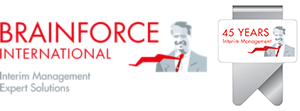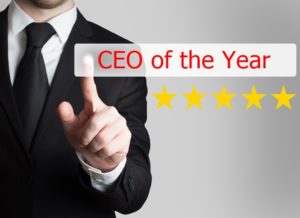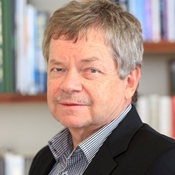“There is not a single goal, rather it is a portfolio of goals”
Peter Staude is CEO of Tongaat Hulett, a South African agriculture and agri-processing business. For his activities he won two Gold pins in Obermatt’s CEO of the year rankings in South Africa. Tongaat Hulet is a stock-listed company with revenues of almost 17 billion ZAR 2017/2018 of (approx. 1.25 billion Swiss Francs).
He has been leading the company for 16 years and for him these awards are a recognition of what Tongaat Hulett has done for the development of the country. In the conversation with Martin Schneider, CEO of the international BRAINFORCE Group, Peter Staude talks about his personal strengths, his best goals for the company and the 63-years old CEO gives some insights in his personal capacity.
Martin Schneider, BRAINFORCE AG: Mr. Staude, you have worked all your professional life with Tongaat Hulett, more than 40 years by now. Have you never had the desire for a change? Do you feel like an entrepreneur?
When I joined Tongaat Hulett, I saw this as my career and a real opportunity to develop people. Formally, I have been working for one company, however, our company has a very diverse business history, having been involved with the manufacture of brick, aluminium, textile and numerous other industries. As such, I worked for many different companies or business units within the organisation. Finally, I was asked to lead the whole company. Regarding your question if I felt like an entrepreneur, there is no doubt that my father, coming from Southern Germany to set up a small factory in South Africa, had a lasting impact on me. As a child I learned t? how to run a business from him and that is what I am still doing today.
Your company has been recognized as a global leader in sustainable water management. Water and Sanitation plays an important role in your company strategy. In what ways does it relate to your main business fields of agricultural processing and Land Conversion?
As an organisation we are exercising our minds around what we can influence in the world and how we can mitigate the impacts of climate change with specific actions. There are numerous examples that I can quote, one that comes to mind is in Mozambique, where we repaired the Muda dam near our Mafambisse operation after the war. With the repaired water storage facility, we improved the lives of many people in the communities located below the dam. Power Generation and Ethanol production using the sugarcane that we grow and process is a key focus for Tongaat Hulett going forward.
How do you select managers for the organisation? Which personal characteristics of employees are the most important for you?
We look for a number of character traits when hiring managers. Firstly, we look for people who see the interconnected nature of our business between customers and suppliers. Secondly, we look for people with the ability to harness multiple stakeholders. Thirdly, at the top two levels, we work very hard to harness the skills for today’s world which are quite different to the requirements of business some 20 years ago.
What do you do specifically in your company for developing talent?
Talent development is not just a one-year conversation! We have been one of the front-runners since the 1970s and 1980s in developing all our employees and we customise the skills development of the individual. An example of this is my development, some 16 years ago. I studied at the University of Cape Town to become a professional executive coach and today Tongaat Hulett has in me a CEO who is also a coach and mentor with the ability to align team members with particular dimensions towards the goals of our organisation. I can proudly say that our country Head in Mozambique is a Mozambican, our country Head in Zimbabwe is a Zimbabwean and both made their careers from starting at the bottom of the organisation.
How would you describe Tongaat Hulett’s internationalization strategy? What foreign markets are your favorites?
In the agriculture industry it is crucial to understand that the local dynamics of countries in Africa are very different. I am really excited about the possibilities that are emerging in Africa. For example, I like Angola. It is going through a renaissance. We are working very hard to encourage the Angolan government to create an import framework for sugar as a base for the ongoing development of the sugar industry. If one considers the specific dynamics of Angola as a country, it would be wrong to potentially consider investing in automated harvesting in the sugarcane industry simply because many people are poor and desperate for employment opportunities.
When we look forward, what is your next goal for Tongaat Hulett? And has the vision changed over the last 20 years?
There is not a single goal, rather it is a portfolio of best goals, for each of our various activities. Our goals, generally spoken, are derived from finding the right equilibrium between our specific context and the operating context. For sure, different periods imply different dynamics and therefore different goals, objectives and vision. In 2002, when Anglo American made clear its intention to separate from Tongaat Hulett, it was eventually a corporate divorce that took ten years to conclude. Today, we have a stable shareholder base and a different vision from that time. Our vision is to influence every country in which we operate in and we seek to make a significant contribution to multiple stakeholders that are impacted by our operations. A good example is Mozambique. After 30 years of war, we decided to develop sugarcane farms there and we started our journey while there were still landmines on the land. In Zimbabwe, it is our goal to be a major part of the renaissance of the country. We are already the largest employer outside the government there.
How do you describe your management style?
My key strength is that I have the ability to look at a complicated landscape to assess its risks and opportunities and to translate them into actions. I also have a track record of flexibility and people have over the years continuously acknowledged my strategic thinking ability. Someone who is overly firm and fixed would seriously struggle in our organisation. Many years ago, when I started to understand how to play golf, I would stop in the middle of a swing and change the club from an 8 iron to a 6 iron because of a sudden change of the wind direction. Similarly, my management style is a strong involvement with people, empathy for others, an understanding of the interface with others. All this with the necessary flexibility in a specific context.
Furthermore, I use the terms sprints and marathons to classify my management decisions. A decision which will take less than six months to get it over the line, I call a sprint. When it takes more than six months to achieve the goal, I call it a marathon. In Tongaat Hulett we work with both in a balanced way, successful sprints and successful marathons.
Do you think this management style could be a model for Africa?
Yes, I do, in the context of a developing continent like Africa. I also think that it is important to draw wider boundaries particularly because one is required to work with multiple stakeholders. Flexibility is also an important requirement when working in Africa simply because the environment tends to be less structured. In my opinion, when you interface with multiple stakeholders you must find the common goal and for this objective to be achieved, a less structured approach is usually more successful.
How do you react to and cope with negative events? What do you feel very proud of?
Usually, I look at the event’s risk profile, and how to mitigate the risks, but I also see the opportunities derived from it. If you do not see the negative you will not see the possibilities. Even in extremely negative events, there are still opportunities.
How do you motivate yourself?
I just keep smiling. There is so many things that I love to do. I appreciate my life as a human being. I wish I had nine lives to be able to do more for people.
What does your family mean to you?
They are very important to me. I make sure that I don’t work seven days a week. My wife is very important to me and my son was born with a leg problem. Despite all the problems associated with it, he is very successful. Today, he is qualified with an Honours Degree in Agricultural Economics and Agronomy.
You have some other functions and responsibilities besides the CEO position. Is there actually any leisure time left?
I am a strong believer in a work-life integration therefore I do balance work and relaxation. I believe in physical fitness and really enjoy cycling. I have completed seven Cape Argus Cycle Tour events but am no longer cycling after a bad fall last year, from which I have made a good recovery. Prior to my cycling accident I played a lot of golf and had a 12 handicap. I am swinging clubs and irons again and my golf game is improving so I am looking forward to getting back to a 12 handicap.
Interview by Martin Schneider, Group CEO BRANFORCE, Zurich/Switzerland




